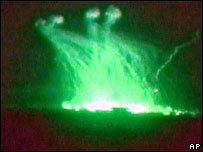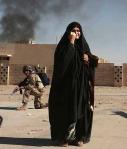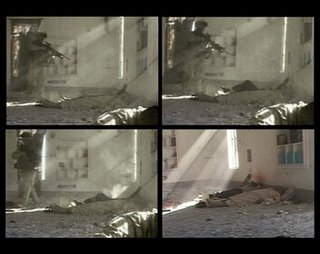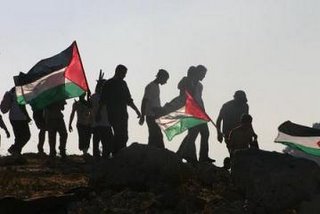Friday, November 18, 2005
'Banned weapons', 'conventional' warfare and some other inapt terms. posted by Richard Seymour

Do you really want to keep emphasising that white phosphorus is an unconventional and/or banned weapon? I ask only because the 'debate' about the use of this horrible substance appears to be sliding into maze of legalism and moralism. Is it quite a chemical weapon? Are the burns thermic or toxic? Is the substance okay because the US isn't a signatory to Protocol III of the 1980 Convention on Certain Conventional Weapons? Does it matter whether or not US troops were strictly aware that concentrations of civilians may be situated in the vicinity of where they were practising their 'Shake and Bake'? Might warfare on the whole be more acceptable if other, perhaps less legally dubious compounds are devised so that the US can annihilate its enemies? Or might we reduce it to a moral question: do not occupiers have a moral responsibility to take the most extraordinary care with civilian lives?
 Take a look, for instance, at this BBC story on the topic. There are a few things to note: 1) It is a vast improvement in terms of accuracy on previous BBC coverage, 2) this is largely because of the pressure from bloggers, acknowledged in the report (even if it doesn't credit The Cat's Blog, which I think broke the story), and 3) it gets bogged down precisely on the sorts of questions questions adumbrated above. It's not entirely the BBC's fault, since antiwar critics have been demanding they get their facts right in relation to the various conventions, which is important in itself but also runs the risk of leading away from much bigger questions.
Take a look, for instance, at this BBC story on the topic. There are a few things to note: 1) It is a vast improvement in terms of accuracy on previous BBC coverage, 2) this is largely because of the pressure from bloggers, acknowledged in the report (even if it doesn't credit The Cat's Blog, which I think broke the story), and 3) it gets bogged down precisely on the sorts of questions questions adumbrated above. It's not entirely the BBC's fault, since antiwar critics have been demanding they get their facts right in relation to the various conventions, which is important in itself but also runs the risk of leading away from much bigger questions. George Monbiot, in a recent contribution to the Media Lens message board, upbraided the media for retailing several falsehoods. So, let me outline what appear to be the facts in this case. White phosphorus is both an incendiary and a chemical substance and if used as a weapon can involve toxic as well as incendiary effects. It has a chemical effect on life processes, not merely a thermic one. As such its use in this fashion could be considered banned under Protocol II, to which the US is a signatory. The US has admitted that civilians may have died as a result of WP burns, though obviously not intentionally, and that it was used as a weapon against fighters. Potentially, then, it had toxic effects in this case, and there would be a case for calling its use a war crime.
George Monbiot, in a recent contribution to the Media Lens message board, upbraided the media for retailing several falsehoods. So, let me outline what appear to be the facts in this case. White phosphorus is both an incendiary and a chemical substance and if used as a weapon can involve toxic as well as incendiary effects. It has a chemical effect on life processes, not merely a thermic one. As such its use in this fashion could be considered banned under Protocol II, to which the US is a signatory. The US has admitted that civilians may have died as a result of WP burns, though obviously not intentionally, and that it was used as a weapon against fighters. Potentially, then, it had toxic effects in this case, and there would be a case for calling its use a war crime. The next question, then, is whether or not you really want to get bogged down in questions of intent, negligence, incompetence and so on. It's a reasonable guess that orders were delivered from high up in the military command to use this stuff. Can we begin to prove that? It's also a reasonable guess that the US troops knew damned well there were civilians packed, terrified, into those houses as they were bombarded, pelted with these chemicals, perforated with bullet-fire. They just didn't give a shit. In fact, since they know that most Iraqis hate their guts and, in many areas at least, assist and comply with resistance attacks, they may well have been quite happy to see a few of the ay-rabs bite airborne and earthbound death. I couldn't prove that in a court of law, and any decision by an international court in the present geopolitical conjuncture would most definitely be contemptible. And I certainly wouldn't want to have to resort to the hateful point that, after all, the occupiers have a moral duty regarding the care and tending of Iraqi civilians and should use nicer, and more precise means of murder.
The next question, then, is whether or not you really want to get bogged down in questions of intent, negligence, incompetence and so on. It's a reasonable guess that orders were delivered from high up in the military command to use this stuff. Can we begin to prove that? It's also a reasonable guess that the US troops knew damned well there were civilians packed, terrified, into those houses as they were bombarded, pelted with these chemicals, perforated with bullet-fire. They just didn't give a shit. In fact, since they know that most Iraqis hate their guts and, in many areas at least, assist and comply with resistance attacks, they may well have been quite happy to see a few of the ay-rabs bite airborne and earthbound death. I couldn't prove that in a court of law, and any decision by an international court in the present geopolitical conjuncture would most definitely be contemptible. And I certainly wouldn't want to have to resort to the hateful point that, after all, the occupiers have a moral duty regarding the care and tending of Iraqi civilians and should use nicer, and more precise means of murder. What happened in Fallujah has become emblematic of the entire invasion and occupation of Iraq. Unable to placate an insurgent population, they have used every wicked and cruel method of tyranny to crush it. Unable to lie to them, they kill them and lie to us instead. Fallujah was one of the most stable cities after the occupation began. Very shortly, the US decided to shoot at some demonstrators, killing many of them. And very shortly after that, repeated skirmishes and growing 'tensions' between the troops and civilians led to an attack on four mercenaries by insurgents and local citizens in which the former were butchered. Close following which, the US responded by launching a military seige on the city, which included attacks on ambulances and resulted in hundreds, if not thousands, of civilian deaths. Iraqis from across the ethnographic spectrum came to the assistance of their beseiged compatriots, with food and medical aid. The US forces were driven out of the city and their departure was celebrated by vast crowds of Fallujans waving banners and placards. But the US was never going to accept that Iraqis might in fact rule themselves, and so began to ready the most appalling series of atrocities that were realised in November last year. A bombing campaign was launched to drive out residents, while males of 'fighting age' were prevented from leaving. And then a seige was started, which involved all the conventional butchery. Half of the homes were destroyed, thousands were killed, and over a hundred thousands civilians remain displaced, living and dying in rough tent camps on the outskirts of the city. Hospitals were deliberately targetted, one bombed and the other occupied. The electricity and water was shut off for the duration of the campaign. If you were unlucky enough to still be in Fallujah when the assault began, you either died or survived a squalid hell. If you were in the vicinity when clouds of white phosphorous were pumped into houses and buildings were insurgents were supposed to be, you may either have had your flesh melted to the bone or choked to death as the stuff blistered your throat and lungs. Or you may well have just copped a bullet or a tank shell, or a missile from a hawk air jet. Now, ask yourself: would you really give a shit whether the US is a signatory to the correct protocol on the use of one of the weapons that got you? As Riverbend puts it: "This war has redefined ‘conventional’. It has taken atrocity to another level. Everything we learned before has become obsolete. ‘Conventional’ has become synonymous with horrifying. Conventional weapons are those that eat away the skin in a white blaze; conventional interrogation methods are like those practiced in Abu Ghraib and other occupation prisons".
What happened in Fallujah has become emblematic of the entire invasion and occupation of Iraq. Unable to placate an insurgent population, they have used every wicked and cruel method of tyranny to crush it. Unable to lie to them, they kill them and lie to us instead. Fallujah was one of the most stable cities after the occupation began. Very shortly, the US decided to shoot at some demonstrators, killing many of them. And very shortly after that, repeated skirmishes and growing 'tensions' between the troops and civilians led to an attack on four mercenaries by insurgents and local citizens in which the former were butchered. Close following which, the US responded by launching a military seige on the city, which included attacks on ambulances and resulted in hundreds, if not thousands, of civilian deaths. Iraqis from across the ethnographic spectrum came to the assistance of their beseiged compatriots, with food and medical aid. The US forces were driven out of the city and their departure was celebrated by vast crowds of Fallujans waving banners and placards. But the US was never going to accept that Iraqis might in fact rule themselves, and so began to ready the most appalling series of atrocities that were realised in November last year. A bombing campaign was launched to drive out residents, while males of 'fighting age' were prevented from leaving. And then a seige was started, which involved all the conventional butchery. Half of the homes were destroyed, thousands were killed, and over a hundred thousands civilians remain displaced, living and dying in rough tent camps on the outskirts of the city. Hospitals were deliberately targetted, one bombed and the other occupied. The electricity and water was shut off for the duration of the campaign. If you were unlucky enough to still be in Fallujah when the assault began, you either died or survived a squalid hell. If you were in the vicinity when clouds of white phosphorous were pumped into houses and buildings were insurgents were supposed to be, you may either have had your flesh melted to the bone or choked to death as the stuff blistered your throat and lungs. Or you may well have just copped a bullet or a tank shell, or a missile from a hawk air jet. Now, ask yourself: would you really give a shit whether the US is a signatory to the correct protocol on the use of one of the weapons that got you? As Riverbend puts it: "This war has redefined ‘conventional’. It has taken atrocity to another level. Everything we learned before has become obsolete. ‘Conventional’ has become synonymous with horrifying. Conventional weapons are those that eat away the skin in a white blaze; conventional interrogation methods are like those practiced in Abu Ghraib and other occupation prisons". If there is a lesson in all this, and one would hope there were at least a few, then the first one is a rule of thumb about imperialism: the more you murder, the more you are obliged to murder. The second one is that the relatively exiguous constraints on some obnoxious weapons are useless when an occupying power decides that it is at war with a population. The US, if it can't use WP, will devise ways of killing efficiently, and from such remove that it will minimise psychological distress for the troops while maximising deniability - "gosh, did we kill civilians, we really had no idea! Just goes to show how terrible the evildoers are for hiding out in residential areas and using human shields like that". Or you can 'delegate nastiness', as politicians are wont to do, allowing death squads to do your dirty work for you. The third rule of thumb is that states are not moral agents, and it is idiotic to suppose that they can be. Any benefits that populations may accrue from imperial adventures are entirely coincidental.
If there is a lesson in all this, and one would hope there were at least a few, then the first one is a rule of thumb about imperialism: the more you murder, the more you are obliged to murder. The second one is that the relatively exiguous constraints on some obnoxious weapons are useless when an occupying power decides that it is at war with a population. The US, if it can't use WP, will devise ways of killing efficiently, and from such remove that it will minimise psychological distress for the troops while maximising deniability - "gosh, did we kill civilians, we really had no idea! Just goes to show how terrible the evildoers are for hiding out in residential areas and using human shields like that". Or you can 'delegate nastiness', as politicians are wont to do, allowing death squads to do your dirty work for you. The third rule of thumb is that states are not moral agents, and it is idiotic to suppose that they can be. Any benefits that populations may accrue from imperial adventures are entirely coincidental.  One last point is that the resistance in Iraq has demonstrated that the left needs to adamantly reject this state-centric approach to understanding and dealing with issues of international solidarity. People misuse the categories of interventionism and isolationism. The former ought not to be conflated with imperialism, and the latter ought not to be conflated with anti-imperialism: the reason that they are is that there is an implicit realist assumption that the state is the only real actor in international affairs. But is not the boycott of Israeli goods and the attempted AUT boycott a form of interventionism? Wasn't the purchasing of Nicaraguan goods in the 1980s a form of intervention against imperialism? Wasn't the ANC solidarity campaign an intervention? Isn't the International Solidarity Movement in Palestine explicitly interventionist? Don't non-state actors engage in international affairs all the time? Look around the world and pick any measly, corrupt, hidebound dictatorship that you can think of. Now ask yourself if the subject people would be better off with Fallujah. Egypt has an atrocious dictatorship, but it is one which will shortly be toppled by some amalgamation of Islamists, leftists and Nasserists. Saudi Arabia is as entrenched and cruel a tyranny as you will find, yet even there people are speaking of a 'Saudi Spring'. Suharto murdered probably as many people as Saddam Hussein in his time, yet was overthrown despite the wishes of the Western governments. If the US, UK and France had their way, the Khmer Rouge would be back in power in Cambodia - it was, to some extent, an upsurge of disgust and horror in the population that prevented their integration into the political system throughout the 1990s. In short, the international system is not to be conceived of as an order or anarchy of states, UN-governed or otherwise. People are not the property of their states, and don't always act as if they are. The correct answer to atrocious regimes, whether domestic or imperialist is a robustly political one, not a moralising one that reduces it to a stark humanitarian situation in which some hero must be sought. We ought to look for the social divisions that constitute the society, and over which the regime presides: from these will emerge the agency capable of overthrowing it.
One last point is that the resistance in Iraq has demonstrated that the left needs to adamantly reject this state-centric approach to understanding and dealing with issues of international solidarity. People misuse the categories of interventionism and isolationism. The former ought not to be conflated with imperialism, and the latter ought not to be conflated with anti-imperialism: the reason that they are is that there is an implicit realist assumption that the state is the only real actor in international affairs. But is not the boycott of Israeli goods and the attempted AUT boycott a form of interventionism? Wasn't the purchasing of Nicaraguan goods in the 1980s a form of intervention against imperialism? Wasn't the ANC solidarity campaign an intervention? Isn't the International Solidarity Movement in Palestine explicitly interventionist? Don't non-state actors engage in international affairs all the time? Look around the world and pick any measly, corrupt, hidebound dictatorship that you can think of. Now ask yourself if the subject people would be better off with Fallujah. Egypt has an atrocious dictatorship, but it is one which will shortly be toppled by some amalgamation of Islamists, leftists and Nasserists. Saudi Arabia is as entrenched and cruel a tyranny as you will find, yet even there people are speaking of a 'Saudi Spring'. Suharto murdered probably as many people as Saddam Hussein in his time, yet was overthrown despite the wishes of the Western governments. If the US, UK and France had their way, the Khmer Rouge would be back in power in Cambodia - it was, to some extent, an upsurge of disgust and horror in the population that prevented their integration into the political system throughout the 1990s. In short, the international system is not to be conceived of as an order or anarchy of states, UN-governed or otherwise. People are not the property of their states, and don't always act as if they are. The correct answer to atrocious regimes, whether domestic or imperialist is a robustly political one, not a moralising one that reduces it to a stark humanitarian situation in which some hero must be sought. We ought to look for the social divisions that constitute the society, and over which the regime presides: from these will emerge the agency capable of overthrowing it.










